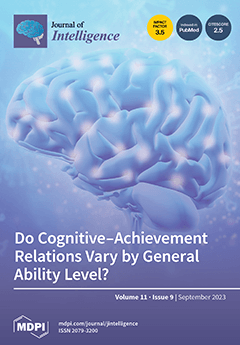Open AccessArticle
The ANTI-Vea-UGR Platform: A Free Online Resource to Measure Attentional Networks (Alertness, Orienting, and Executive Control) Functioning and Executive/Arousal Vigilance
by
Tao Coll-Martín, Rafael Román-Caballero, María del Rocío Martínez-Caballero, Paulina del Carmen Martín-Sánchez, Laura Trujillo, Luis Cásedas, M. Concepción Castellanos, Klara Hemmerich, Greta Manini, María Julieta Aguirre, Fabiano Botta, Andrea Marotta, Elisa Martín-Arévalo, Fernando G. Luna and Juan Lupiáñez
Cited by 10 | Viewed by 2886
Abstract
The Attentional Networks Test for Interactions and Vigilance—executive and arousal components (ANTI-Vea) is a computerized task of 32 min duration in the standard format. The task simultaneously assesses the main effects and interactions of the three attentional networks (i.e., phasic alertness, orienting, and
[...] Read more.
The Attentional Networks Test for Interactions and Vigilance—executive and arousal components (ANTI-Vea) is a computerized task of 32 min duration in the standard format. The task simultaneously assesses the main effects and interactions of the three attentional networks (i.e., phasic alertness, orienting, and executive control) and two dissociated components of vigilance with reasonable reliability (executive and arousal vigilance). We present this free and publicly accessible resource (ANTI-Vea-UGR; https://anti-vea.ugr.es/) developed to easily run, collect, and analyze data with the ANTI-Vea (or its subtasks measuring some attentional and/or vigilance components embedded in the ANTI-Vea). Available in six different languages, the platform allows for the adaptation of stimulus timing and procedure to facilitate data collection from different populations (e.g., clinical patients, children). Collected data can be freely downloaded and easily analyzed with the provided scripts and tools, including a Shiny app. We discuss previous evidence supporting that attention and vigilance components can be assessed in typical lab conditions as well as online and outside the laboratory. We hope this tutorial will help researchers interested in measuring attention and vigilance with a tool useful to collect data from large sample sizes and easy to use in applied contexts.
Full article
►▼
Show Figures






